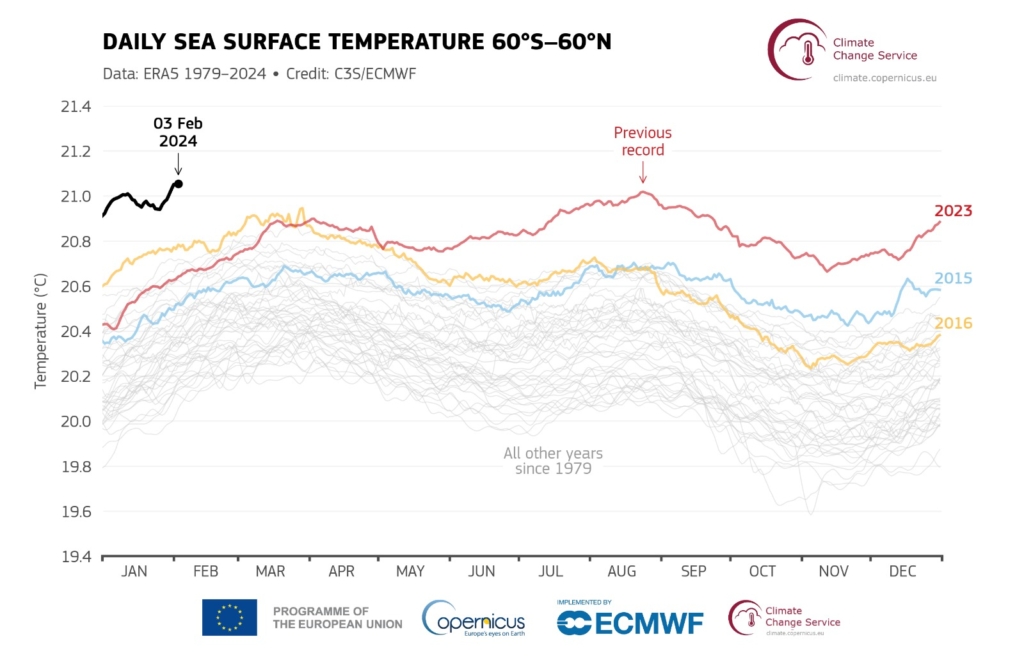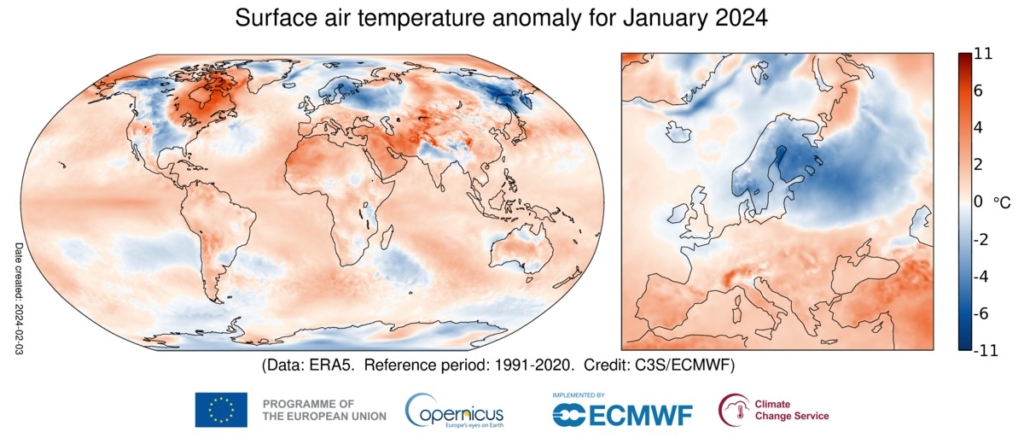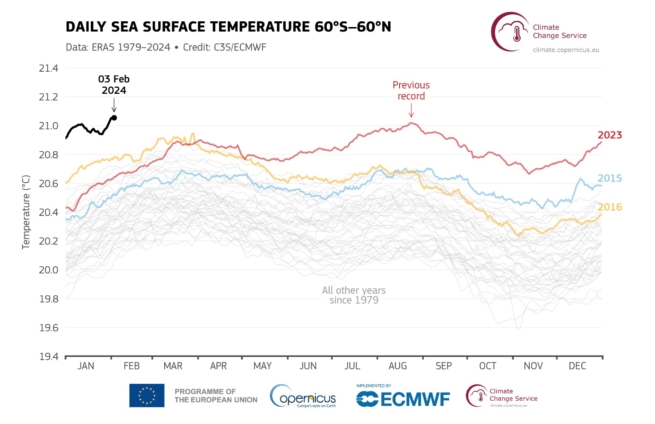According to recent data from the Copernicus Climate Change Service (C3S), January 2024 has been identified as the warmest January globally on record. The average ERA5 surface air temperature for the month was 13.14°C, surpassing the 1991-2020 average for January by 0.70°C and exceeding the temperature of the previous warmest January in 2020 by 0.12°C.
This marks the eighth consecutive month where the recorded temperatures set new records for their respective months. Although the global temperature anomaly for January 2024 was lower compared to the last six months of 2023, it remained higher than any anomalies recorded before July 2023.
In relation to a pre-industrial reference period (1850-1900), January 2024 was notably warmer, registering a 1.66°C increase in comparison to the estimated January average for that period.
Furthermore, the global mean temperature for the twelve months from February 2023 to January 2024 has reached unprecedented levels, standing at 0.64°C above the 1991-2020 average and a substantial 1.52°C above the pre-industrial average from 1850-1900.
C3S, implemented by the European Centre for Medium-Range Weather Forecasts (ECMWF), reported diverse temperature patterns across Europe in January 2024. The temperatures in the Nordic countries were significantly below the 1991-2020 average, while in the southern regions of the continent, temperatures were notably higher than the average for the same period.

Beyond the European continent, temperatures exhibited distinctive trends. Eastern Canada, north-western Africa, the Middle East, and central Asia experienced temperatures well above the average. Conversely, western Canada, the central USA, and the majority of eastern Siberia witnessed temperatures below the average.
While El Niño started to weaken in the equatorial Pacific during this period, marine air temperatures, in general, remained persistently elevated, contributing to the overall global temperature dynamics.
The average global sea surface temperature (SST) for January within the latitudes 60°S–60°N has set a new record at 20.97°C. This surpasses the previous warmest January recorded in 2016 by 0.26°C and stands as the second-highest value for any month in the ERA5 dataset, closely trailing the record from August 2023 by only 0.01°C (20.98°C).
Furthermore, since January 31, the daily SST for the same latitudinal range has consistently established new absolute records, exceeding the previous highest values recorded on the 23rd and 24th of August 2023.
Samantha Burgess, Deputy Director of the Copernicus Climate Change Service (C3S), highlighted the extraordinary nature of 2024's start. Not only does it mark the warmest January on record, but it also concludes a 12-month period with temperatures consistently surpassing 1.5°C above the pre-industrial reference period. Burgess emphasized the urgency of significant reductions in greenhouse gas emissions as the imperative measure to mitigate the continuous rise in global temperatures.
“2024 starts with another record-breaking month – not only is it the warmest January on record but we have also just experienced a 12-month period of more than 1.5°C above the pre-industrial reference period. Rapid reductions in greenhouse gas emissions are the only way to stop global temperatures increasing,” he said.
In contrast to the warmer sea surface temperatures, the Arctic sea ice extent in January was relatively close to the average and marked the highest for the month since 2009. Notably, sea ice concentrations were above average in the Greenland Sea, a trend that has persisted since October, as well as in the Sea of Okhotsk. Conversely, below-average sea ice concentrations were observed in the Labrador Sea.

Antarctic sea ice extent, on the other hand, ranked as the sixth lowest for January, recording an 18% deficit compared to the average. Although this was higher than the lowest January value observed in 2023 (which was at -31%), below-average sea ice concentrations were prominent in areas such as the Ross and Amundsen Seas, the northern Weddell Sea, and along the coast of East Antarctica.
In terms of precipitation, January 2024 saw wetter-than-average conditions across significant portions of Europe, notably impacted by storms in north- and south-western Europe. Conversely, drier-than-average conditions were observed in regions including south-eastern and northern Spain, the Maghreb, southern UK, Ireland, eastern Iceland, most of Scandinavia, parts of north-western Russia, and the eastern Balkans.
Outside of Europe, January 2024 witnessed wetter-than-average conditions in various regions globally. Notable areas included western and south-eastern USA, a significant portion of Eurasia, south-eastern South America, southeast Africa, and northern and eastern Australia. In these regions, precipitation levels exceeded the usual averages.
Conversely, drier-than-average conditions prevailed across several locations, including parts of western and southern North America, Canada, the Horn of Africa, the Arabian Peninsula, and south-central Asia. Additionally, Australia and Chile experienced dry conditions that contributed to the occurrence of wildfires in these regions.
Latest Stories
-
Frank Lampard praises Thomas-Asante’s work ethic despite Coventry loss
33 minutes -
Reschedule loan payments for traders affected by Kantamanto fire – GUTA begs banks
1 hour -
I’m comfortable in any forward position – Semenyo on preferred role
1 hour -
This is the best I’ve ever felt – Semenyo on 2024/2025 PL form
2 hours -
Ghana suspends diplomatic relations with Sahrawi Arab Democratic Republic
2 hours -
I trust Mahama to deliver; Ghanaians should have patience with him – Bridget Bonnie
2 hours -
Mahama to hold emergency meeting with energy sector players over threat of dumsor
2 hours -
Accra is 5th most expensive city in Africa in terms of rent
2 hours -
A new chapter for African women’s football with CAF U17 GIFT kick-off in Tanzania
2 hours -
Exit of multinational firms due to high inflation, currency weakness – Deloitte
2 hours -
Constitution’s impeachment provisions for Chief Justice are ‘inadequate’, says Sophia Akuffo
2 hours -
We won’t be a disruptive Minority but will serve the interest of Ghanaians – Gideon Boako
3 hours -
‘Merit over patronage’ – Sophia Akuffo calls for overhaul of Chief Justice selection process
3 hours -
GPL: You have benefited from refereeing decisions – Dreams FC slams Accra Lions for calling for reforms
3 hours -
Deschamps to leave France job after 2026 World Cup
4 hours

